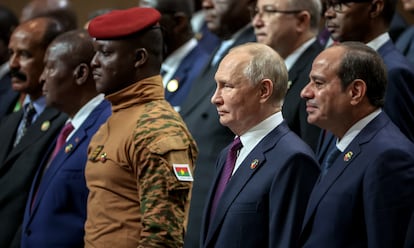Russia expands its presence in the Sahel
Moscow agrees to strengthen its military cooperation with Niger while the Rosatom company commits to developing nuclear energy in Mali and Burkina Faso

Russia continues to strengthen its ties with African countries and, in particular, those in the Sahel. Last week, Niger became the latest African country to sign a military cooperation agreement with Moscow. There are already more than 40 nations that are receiving training, advice and, above all, matériel from the Russian army or from one of the private security companies, such as Wagner. However, it is not just a question of security. Behind the mercenaries, helicopters, and instructors, Russia is also extending its soft power throughout the Sahel, forging commercial links and building key infrastructure. The latest examples are the gold refinery projects in Mali and the agreement to develop nuclear energy there and in Burkina Faso.
Last week, Niger's Prime Minister Ali Lamine Zeine and Defense Minister General Salifu Modi met in Moscow with senior officials from the Russian Defense Ministry. Both sides agreed to strengthen security relations, as well as “intensify joint actions to stabilize the situation in the region,” according to a Kremlin statement. The objective, the note adds, is to “increase the combat readiness” of Niger's military.
In this way, this Sahel country, governed by a military junta since the coup d’état last summer, has followed the path of its neighbors Mali and Burkina Faso, which, after expelling French troops from their territory, already have Russian instructors on the ground. The Russians are helping them in their war against Al-Qaeda and the Islamic State jihadis, who are the greatest threat in the region. In parallel, European defense cooperation missions, such as the EUTM in Mali and GAR-SI Sahel, in which Spain has played a very important role, are currently at a standstill and on the verge of disappearing completely.
Huge mineral reserves
However, Russian cooperation with the Sahel goes far beyond the military field. Two of the continent’s great challenges are to advance in the transformation of its enormous mineral reserves and the energy sector, which go hand in hand. More than half of Africa’s 1.4 billion people do not have access to electricity, and it is impossible to think of industrialization without energy. Russia has stepped on the accelerator in both areas and has offered to help develop nuclear power in the region, a source it knows well. The State Atomic Energy Company (Rosatom) has bilateral agreements with twenty African countries, including its star project: the construction of a nuclear power plant with four reactors west of Alexandria, in Egypt. The project is 85% financed by Moscow.
In the context of intensifying its relations with the Sahel countries, during the VI Forum of the Russian Energy Week last October, Rosatom signed agreements with Burkina Faso and Mali that include developing the technology in both countries. According to the company itself, “Russia is actively developing cooperation with foreign countries. Despite external constraints, the domestic economy is increasing its export potential, delivering goods, services, and raw materials worldwide. Rosatom and its divisions are actively involved in this work.”
In Mali, furthermore, Russia has also reached an agreement with the military authorities for the construction of the largest gold refinery in West Africa, which will have the capacity to produce about 200 tons each year, according to the Minister of Economy and Finance, Alousséni Sanou. “This will allow us to not only control all gold production, but we will also be able to correctly apply all taxes and duties,” Sanou said. In 2022, Mali produced about 72 tons of gold, of which six come from traditional, small-scale extraction and the rest from foreign companies, most notably from Canada, Australia, and the U.K. The precious metal represents 25% of the national budget, 75% of export income, and 10% of the gross domestic product, according to the Malian government, which has just reformed the country’s Mining Code.
Russia’s return to Africa, after the glory days of the Soviet Union, began in the mid-2000s, but the definitive boost came after the invasion of Crimea by Russian troops in 2014, and it had its golden hour in 2019 with the first Russia-Africa summit, held in Sochi. With this strategy, Moscow is seeking to break the isolation to which the Western bloc intends to subject it and gain access to markets and natural resources. Although the favored regions of this cooperation are the Maghreb and the southern countries, in recent years its influence has spread to practically every corner of the continent, with the Sahel as the spearhead of a strategy that benefits from and stimulates the decline of Western presence.
The second Africa-Russia summit, held in Saint Petersburg in 2023, saw around twenty African heads of state in attendance as well as Russian President Vladimir Putin himself. The trade volume, certainly even far from China, India, and the European Union, has practically doubled in the last decade, according to the Center for Strategic and International Studies. The grain diplomacy launched by Russia in the current conflict in Ukraine shows the strength of the ties: Moscow is asking nothing in return for sending wheat to six African countries: Mali, Burkina Faso, the Central African Republic (where Wagner plays a decisive role), Zimbabwe, Somalia, and Eritrea.
Sign up for our weekly newsletter to get more English-language news coverage from EL PAÍS USA Edition.
Tu suscripción se está usando en otro dispositivo
¿Quieres añadir otro usuario a tu suscripción?
Si continúas leyendo en este dispositivo, no se podrá leer en el otro.
FlechaTu suscripción se está usando en otro dispositivo y solo puedes acceder a EL PAÍS desde un dispositivo a la vez.
Si quieres compartir tu cuenta, cambia tu suscripción a la modalidad Premium, así podrás añadir otro usuario. Cada uno accederá con su propia cuenta de email, lo que os permitirá personalizar vuestra experiencia en EL PAÍS.
¿Tienes una suscripción de empresa? Accede aquí para contratar más cuentas.
En el caso de no saber quién está usando tu cuenta, te recomendamos cambiar tu contraseña aquí.
Si decides continuar compartiendo tu cuenta, este mensaje se mostrará en tu dispositivo y en el de la otra persona que está usando tu cuenta de forma indefinida, afectando a tu experiencia de lectura. Puedes consultar aquí los términos y condiciones de la suscripción digital.









































